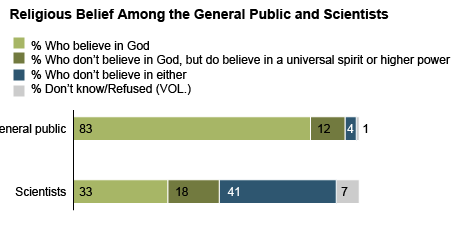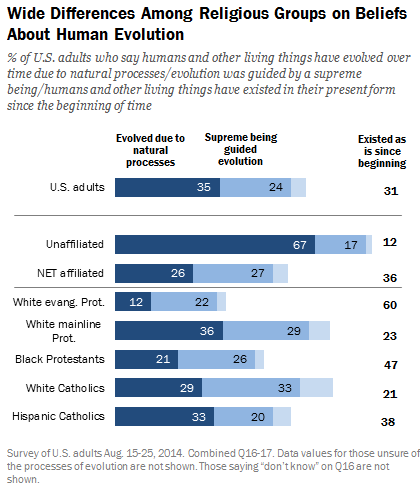The overwhelming majority of scientists accept evolution by natural selection according to the latest Darwin Day Pew research from 2019:

According to Pew research, 1/3rd of scientist is religious. So if you do the math, only a very small percentage of Christian scientists - those most likely to understand all aspects of the subject - actually reject evolution by natural selection.

Second, as is pointed out in the comments to the question, acceptance of evolution varies by denomination:

Interestingly, the official body or prominent figures of several denominations have actually accepted evolution as a possible guided explanation for the origins of mankind. These include:
- Catholicism (1950 under Pope Pius XII)
- Orthodox Christianity
- Anglican
- Episcopalian
- Methodist
- Church of the Nazarene
However, of these, only Orthodox Christianity, rejects the concept of original sin - which of course is a paradox: if you accept a form of guided evolution, this de facto nullifies the possibility of mankind originating from a single pair of ancestors.
Now to the crux of your question: many Christians think that the view on original sin has been the same for the last 2000 years, and that the arrival of the scientific theory of evolution was the first time in history this concept was challenged. This is not the case.
Early Christians first claimed that humans have fallen from grace: because of the actions of the Biblical first parents, Adam and Eve, we are now in a state of sin. Later Christians began to differ on what the condition of sin amounted to: is this a lack of a state once possessed, or something more? Christian theologians, started to wonder whether we could actually be considered guilty of being born with original sin, based on the Biblical texts.
The Biblical basis for original sin is not as substantial as you might think. Genesis 2-3 includes an account of a human fall in the Garden of Eden but doesn’t say anything about original sin. It only speaks of a curse and of unclear consequences for having eaten of the forbidden fruit.
And the LORD God commanded him, “You may eat freely from every tree of
the garden, but you must not eat from the tree of the knowledge of
good and evil; for in the day that you eat of it, you will surely die. _ Gen 2:16-17
and:
And to Adam He said:
“Because you have listened to the voice of your wife
and have eaten from the tree
of which I commanded you not to eat,
cursed is the ground because of you;
through toil you will eat of it
all the days of your life.
Both thorns and thistles it will yield for you,
and you will eat the plants of the field.
By the sweat of your brow
you will eat your bread,
until you return to the ground—
because out of it were you taken.
For dust you are,
and to dust you shall return. - Gen 3:17-19
This does not explicitly state that we are guilty of Adam’s sin because we are Adam’s heirs. The whole concept is mostly based on interpretation of the texts, but not explicitly mentioned in there.
In fact, it's not until Augustine the concept we today refer to as original sin takes form. He based this primarily on the following verses:
Paul, in Romans 5, which does not really explain original sin:
Therefore, just as sin entered the world through one man, and death
through sin, so also death was passed on to all men, because all
sinned. For sin was in the world before the law was given; but sin is
not taken into account when there is no law. - Romans 5:12-13
Corinthians 15:21-22, which only mentions death, not sin:
For since death came through a human being, the resurrection of the
dead has also come through a human being; for as all die in Adam, so
all will be made alive in Christ.
Psalms 5:15
Indeed, I was born guilty, a sinner when my mother conceived me.
As you can see, his conclusion requires some combined interpretation of these verses. It is therefore not surprising the initial reaction to this conclusion was very hostile. After a long and bitter struggle of several councils, the Second Council of Orange in 529 confirmed the general principles of Augustine's teaching within Western Christianity.
However, even after Augustine's authority was accepted, he was interpreted in the light of writers such as Cassian. Some of the followers of Augustine identified original sin with concupiscence in the psychological sense, but Saint Anselm of Canterbury challenged this identification in the 11th-century, defining original sin as "privation of the righteousness that every man ought to possess", thus separating it from concupiscence.
In the 12th century the identification of original sin with concupiscence was supported by Peter Lombard and others, but was rejected by the leading theologians in the next century, most notably by Thomas Aquinas. Aquinas distinguished the supernatural gifts of Adam before the fall from what was merely natural, and said that it was the former that were lost, privileges that enabled man to keep his inferior powers in submission to reason and directed to his supernatural end. Even after the fall, man thus kept his natural abilities of reason, will and passions. Rigorous Augustine-inspired views persisted among the Franciscans, though the most prominent Franciscan theologians, such as Duns Scotus and William of Ockham, eliminated the element of concupiscence and identified original sin with the loss of sanctifying grace.
In addition, Eastern Orthodox theology has questioned Western Christianity's ideas on original sin from the outset and does not promote the idea of inherited guilt.
So as you can see, the concept is not, as many Christians think today, part of the original Christian theology, and has led to very different interpretations and disputes over the centuries.



